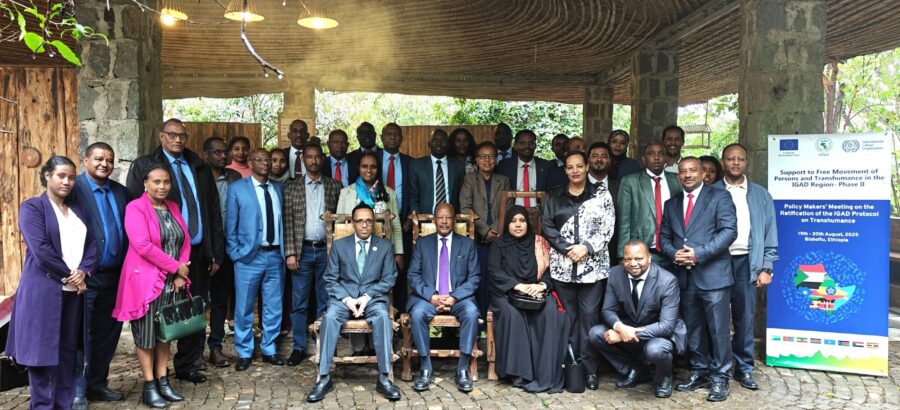August 19-20, 2025 (BISHOFTU, Ethiopia) With funding from the European Union, ICPALD held a two-day Ethiopian Policy Makers’ session on the ratification of the IGAD Transhumance Protocol, bringing together national parliamentarians and relevant experts.
In opening on behalf of IGAD Executive Secretary Dr. Workneh Gebeyehu, Head of Mission to Ethiopia Abebaw Belachew applauded Ethiopia for demonstrating commitment to ASAL development by adopting a policy on pastoralism and institutionalizing the sector at high policy organ level.
Hon. Dr. Dima Neggo, Chairman of Ethiopia Foreign Relations and Peace Affairs Standing Committee pledged parliament’s support to fast-track the Protocol through the parliamentary process.
“The Protocol structure will ensure transhumance contribution to Horn of Africa’s economy is better harnessed,” said Dr. Guyo Roba – Head of Drylands Development, on behalf of ICPALD Director Dr. Dereje Wakjira. Echoing this, Solomon Wakgari, Snr. Advisor to the State Minister for Irrigation & Lowlands added that “the Protocol will be a precursor for future regional integration and provides a leading avenue for tapping the vast opportunities in the region.”
Convened under Phase II Program of Support to Free Movement of Persons and Transhumance in the IGAD Region, the session sensitized participants on the strategic importance of the Protocol; and engaged key policymakers, legislators, and government technical experts to fast-track its ratification (domestication) by Parliament.
The delegates engaged in a plenary session on parliamentary procedures and roles, including those of the Ethiopian Ministries of Foreign Affairs, Agriculture and Irrigation & Lowlands, in ratifying the Transhumance Protocol. It was suggested that there is need to eventually deposit the instrument of ratification with other RECs like the AU, EAC, SADC, and ECOWAS amongst others.
These deliberations culminated in a clear roadmap and commitments for the post-ratification process and implementation at the national level.
###
Background
The need for an IGAD transhumance protocol is premised on the critical importance of seasonal livestock mobility as a survival and production strategy for millions of pastoralists in the IGAD region. The arid and semi-arid lands (ASALs) of the region experience frequent and intense climate shocks, particularly prolonged droughts, erratic rainfall, and resource degradation. These extreme weather changes, driven by climate change, have led to increased pastoral herders’ movement with their livestock to access pastures and water for their survival.
Transhumant pastoralism contributes between 6% and 10% of GDP in IGAD Member States and supports 70% of the livelihoods in the IGAD region. The IGAD Member States have come up with various strategies and policy frameworks to minimize the challenges posed by the transboundary nature of transhumance. The IGAD Protocol on Transhumance is a great stride towards a comprehensive response to enhance sustainable pastoral development for the IGAD Member States.
The development and adoption of the IGAD Transhumance Protocol and its Implementation Roadmap underwent a robust participatory process and consultations with Member States between 2017-2021. After the Protocol’s endorsement by the IGAD Committee of Ambassadors in February 2020, the Line Ministers responsible for Livestock and Pastoral Development adopted the Implementation Roadmap for the Protocol in November 2020. The Protocol was later adopted by the IGAD Council of Ministers on 24th June 2021 during the 72nd Session of the IGAD Council of Ministers. The adoption of the Protocol paved way for the signing, ratification and domestication of the Protocol by the Member States.
Ethiopia became the third country to sign the Protocol during the 48th Ordinary Session of the IGAD Council of Ministers in Khartoum on 30th November 2022. The Protocol was now being presented to the Ethiopia National Assembly for ratification by Parliament.






